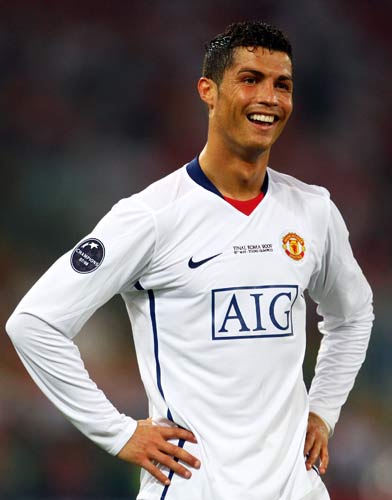Real 'face £26m fine' if they back out of Ronaldo bid
Madrid vice-president says penalty clause will force club to step up chase for star

Real Madrid are preparing to step-up their campaign to sign Cristiano Ronaldo amid suggestions that not signing him would cost the club €30m (£26.2m).
The outlandish claim that Madrid will trigger a penalty clause if they end up passing on the Manchester United player surfaced after the club's vice-president, Fernando Tapias, appeared on Spanish Radio station Cadena COPE. He was asked about the infamous alleged pre-contract agreement between former Real Madrid president Ramon Calderon and Ronaldo's agent Jorge Mendes made last summer.
It was put to him that the agreement stipulated that Madrid would either have to pay €90m to sign Ronaldo or a €30m penalty if they did not, and Tapias responded: "Yes... but that is not our fault. Ronaldo is a great player. I remember when I was last at the club and [Luis] Figo was here telling people about him. He is one of the best players in the world. That he has a special character and that the price is exorbitant is also true. Maybe Fifa should put a €50m cap on transfers."
The suggestion that the previous Madrid regime have lumbered the new president Florentino Perez with the obligation to sign Ronaldo is being viewed by some as unlikely – especially the €30m penalty – and the club may simply be using it as the perfect excuse for Perez, who may later be criticised for over-spending on the Portuguese international by his own supporters.
It also signals the start of a new media offensive designed to highlight the club's clear intention to go for the world's most commercially lucrative player. Perez has been on an interview marathon since officially becoming president earlier in the week, repeating the mantra that signing the most expensive players was often the cheapest way to bring prosperity to the club.
He said: "People say that [Zinedine] Zidane was the most expensive signing but he turned out to be the cheapest in many ways. It was that type of signing that made us the club with the highest income in the world.
"When [David] Beckham came we went from earning €7m a year to €45m a year through our deals with our sponsors. We salvaged the situation of the club. If Cristiano Ronaldo comes, even though he is currently with Nike, he then puts on an Adidas shirt every week. There are certain players who are very profitable because they have spectacular commercial repercussions that earn the club money."
Despite vice-president Tapias' calls for a Fifa cap on transfers set at €50m, Real Madrid are expected to complete the €56m signing of Kaka on Monday. After Chelsea denied any bids had been tabled from Stamford Bridge Madrid were left as sole bidders and Milan were last night attempting to appease supporters upset by the departure of their hero.
Milan vice-president Adriano Galliani, who met with Perez on Monday to negotiate Kaka's sale, said: "We cannot keep justifying losing €70m a season." As The Independent reported on Tuesday, Kaka will sign for five years for €9m a season. The Brazil midfielder has been given the option of Zidane's old No 5 shirt.
Kaka is understood to be keen for the transfer to be announced but Silvio Berlusconi will not do so until Monday, leaving time for the European Elections to pass and for a potential replacement for Kaka to be found.
Barcelona striker Samuel Eto'o is understood to be one big-name possibility after the Catalan club admitted they would be unlikely to turn down a "considerable offer" for the 28-year-old, whose contract runs out at the end of next season.
In another twist to the soap opera unfolding in Milan, Madrid and Manchester, Berlusconi, seemingly ignoring his vice-president's concerns over the club's annual losses, last night said he spoke to Ronaldo when he shook his hand in the medal presentation ceremony after the Champions League final. He said: "I told him 'I would love to see you wearing the red and black of Milan next season'."
Real rich: Where Madrid's money comes from
* Clubs in Spain are free to negotiate separate deals rather than central contracts. Madrid signed a £700m seven-year deal with MediaPro in 2006, seeing them easily top £100m a year, double United's earnings.
* Their bids for top players are also aided by Spain's tax laws – foreign players pay tax at just 23 per cent for their first five years. In England the 50p tax means clubs have to pay more to match wages on offer in Spain.
* The club's status in Spain helps them maintain their place at the forefront of European football. All debts they hold are with local banks, rather than relying on American billionaires or Russian oil companies. These banks are pressured to allow Madrid certain unwritten privileges, such as low interest repayments on loans. Their stature and standing in the country means they are unaffected by issues that could affect smaller clubs.
* Real Madrid have finished top of the Deloitte Money League for four years. The Bernabeu enjoys the third-highest average attendance in Europe while overseas trips generate revenue through ticket and merchandise sales.
Subscribe to Independent Premium to bookmark this article
Want to bookmark your favourite articles and stories to read or reference later? Start your Independent Premium subscription today.

Join our commenting forum
Join thought-provoking conversations, follow other Independent readers and see their replies